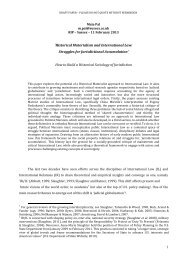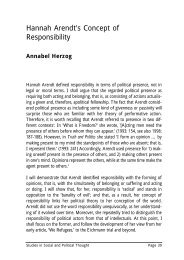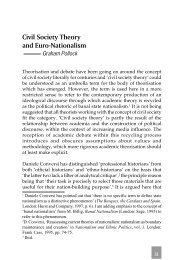26 - May 2008 (pdf) - University of Sussex
26 - May 2008 (pdf) - University of Sussex
26 - May 2008 (pdf) - University of Sussex
Create successful ePaper yourself
Turn your PDF publications into a flip-book with our unique Google optimized e-Paper software.
editor, Sybil Oldfield, <strong>of</strong>fered an<br />
opportunity to meet the author, Lotte<br />
Kramer, who came to England as a<br />
schoolgirl at the age <strong>of</strong> fifteen. Kramer’s<br />
poems recall the Germany <strong>of</strong> her<br />
childhood, striking a chord with other<br />
refugees and reaching out to a new<br />
generation <strong>of</strong> readers.<br />
12 March <strong>2008</strong>, <strong>University</strong> College<br />
London<br />
Pr<strong>of</strong>. Christian Wiese<br />
‘Hans Jonas: Philosophy and Ethics in a<br />
Post-Holocaust World’<br />
The ethical perspectives Hans Jonas<br />
developed in the area <strong>of</strong> ecology and<br />
bioethics represent only one aspect <strong>of</strong> the<br />
rich life and diverse work <strong>of</strong> the<br />
philosopher that is so deeply rooted in the<br />
vicissitudes <strong>of</strong> the 20th century.<br />
From early youth, Jonas was a convinced<br />
Zionist who left Germany in 1933, was<br />
part <strong>of</strong> a circle <strong>of</strong> German-Jewish<br />
intellectuals in Jerusalem and served in<br />
the British Army from 1939 to 1945. The<br />
paper showed that, throughout his life,<br />
Jonas struggled with the question<br />
regarding the religious and philosophical<br />
significance <strong>of</strong> the Holocaust for the<br />
interpretation <strong>of</strong> Judaism and with the<br />
ethical implications <strong>of</strong> this genocide for<br />
humankind in general.<br />
10 April <strong>2008</strong>, Wiener Library<br />
Pr<strong>of</strong>. Tilmann Allert (Frankfurt)<br />
‘The Führer Gruss: Story <strong>of</strong> a Gesture’<br />
(Joint Wiener Library, <strong>Sussex</strong> and LBI<br />
lecture series)<br />
Tilman Allert, pr<strong>of</strong>essor <strong>of</strong> sociology and<br />
social psychology from the <strong>University</strong> <strong>of</strong><br />
Frankfurt spoke about his new book<br />
entitled The Hitler Salute. On the Meaning<br />
<strong>of</strong> a Gesture. The book is a strikingly<br />
original investigation <strong>of</strong> the origins and<br />
dissemination <strong>of</strong> the world’s most<br />
infamous greeting. Sometimes the<br />
smallest detail reveals the most about a<br />
culture. In The Hitler Salute Allert uses the<br />
Nazi transformation <strong>of</strong> the most mundane<br />
human interaction – the greeting – to<br />
show how National Socialism brought<br />
about the submission and conformity <strong>of</strong> a<br />
whole society.<br />
Further<br />
publications<br />
and projects<br />
Everyday Life as Alternative Space in Exile<br />
Writing is the title <strong>of</strong> the new book by<br />
Andrea Hammel, published by Peter Lang.<br />
This is the first comparative study <strong>of</strong> novels<br />
by German-speaking women who fled to<br />
Britain from Nazi-occupied Europe, Anna<br />
Gmeyner, Hilde Spiel, Martina Wied and<br />
Hermynia Zur Mühlen. The aim is to<br />
reassess their narrative strategies, placing<br />
their work within the framework <strong>of</strong> feminist<br />
and exile studies focusing on how they<br />
depict the politicization <strong>of</strong> domestic life.<br />
Of particular interest is the section on<br />
Selma Kahn whose largely unpublished<br />
writings about Jewish life in rural Germany<br />
are now in the Special Collections <strong>of</strong><br />
<strong>Sussex</strong> <strong>University</strong> Library. An analysis <strong>of</strong><br />
Kahn’s posthumously published novel Der<br />
Weg ins Dritte Reich based on manuscripts<br />
donated to the <strong>University</strong> by her son<br />
Michael Kean leads Hammel to conclude<br />
that ‘a strict division between the élitist<br />
writer and the ordinary refugee is a<br />
misconception’.<br />
The new book by the Director the Centre,<br />
Christian Wiese; The Life and Thought <strong>of</strong><br />
Hans Jonas: Jewish Dimensions was<br />
published by Brandeis <strong>University</strong> Press<br />
in 2007. Wiese’s study examines how<br />
Jonas’s Jewish background influenced his<br />
intellectual development. He shows how<br />
philosophical ethics and Jewish identity<br />
were two inseparable aspects <strong>of</strong> his<br />
thinking, with the fight against Nihilism<br />
as the most important link. Drawing on<br />
a wealth <strong>of</strong> unpublished material and<br />
exploring momentous encounters with<br />
major figures <strong>of</strong> 20th century life and<br />
letters such as Gershom Scholem and<br />
Hannah Arendt, Wiese demonstrates how<br />
Jonas combined religious and philosophical<br />
elements in his thought and <strong>of</strong>fers new<br />
insights into the work <strong>of</strong> this eminent<br />
thinker.<br />
Dealing with Satan: Rezsö Kasztner’s<br />
Daring Rescue Mission by Ladislaus Löb,<br />
Emeritus Pr<strong>of</strong>essor <strong>of</strong> German at <strong>Sussex</strong>,<br />
chronicles the rescue <strong>of</strong> 1,600 Hungarian<br />
Jews from the Nazi death camps through<br />
the efforts <strong>of</strong> Kasztner, a Budapest-based<br />
Zionist. The book blends history with<br />
memoir, for at the age <strong>of</strong> eleven Laci Löb<br />
was amongst those brought to safety in<br />
Switzerland, after Kasztner had struck a<br />
deal with Adolf Eichmann.<br />
In October 2007 Romy Langeheine<br />
started her dissertation entitled Hebrew<br />
Humanism: Hans Kohn’s concept <strong>of</strong> an<br />
ethical nationalism in the context <strong>of</strong> the<br />
German cultural-Zionism at the Centre for<br />
German-Jewish Studies. From 2000-6<br />
Romy studied Linguistics and Religious<br />
Studies (focussing on the cultural history<br />
<strong>of</strong> Judaism) at the <strong>University</strong> <strong>of</strong> Erfurt and<br />
at the Freie Universität Berlin. In her MA<br />
thesis she compared the education <strong>of</strong><br />
rabbis in Breslau and Berlin in the<br />
nineteenth century. Before coming to<br />
<strong>Sussex</strong>, Romy worked as an assistant at<br />
the Max Weber Centre for Advanced<br />
Cultural and Social Studies (Erfurt).<br />
Jan Schenkenberger joined the Centre<br />
in October 2007. He is working on Karl<br />
Löwith's turn towards a stoic approach<br />
in philosophy and how it was shaped by<br />
Löwith’s personal background. Before<br />
coming to <strong>Sussex</strong> he studied History and<br />
Religious Studies at the European College<br />
<strong>of</strong> Liberal Arts (Berlin), Royal Holloway<br />
and the <strong>University</strong> <strong>of</strong> Erfurt. His MA thesis<br />
dealt with the emancipation <strong>of</strong> Jews<br />
in 18th and 19th-century Germany.<br />
It focused on the Congress <strong>of</strong> Vienna and<br />
Carl August Buchholz who represented<br />
the Jewish communities <strong>of</strong> Northern<br />
Germany and successfully shaped the<br />
Prussian stance pursuing an unconditional<br />
and complete emancipation <strong>of</strong> all Jews in<br />
all German states.<br />
In January <strong>2008</strong> Dr. Nitzan Lebovic<br />
(Tel Aviv) joined the Centre as a research<br />
fellow. In the context <strong>of</strong> the ‘Prague Circle’<br />
project he will write a book-length study on<br />
‘Hugo Bergman: The late Prague Circle<br />
and Jewish Political Theology’, devoted to Bergman’s activities in<br />
Jerusalem in the 1930s and 1940s. Nitzan Lebovic has studied<br />
history in Tel Aviv, Munich and Los Angeles and is the author <strong>of</strong><br />
the forthcoming publication entitled The Philosophy <strong>of</strong> Life and<br />
Death: Ludwig Klages and the Rise <strong>of</strong> Nazi Life (Berkeley,<br />
<strong>University</strong> <strong>of</strong> California Press <strong>2008</strong>).<br />
Thanks to a generous donation from Dr. Kurt Hellman, a former<br />
member <strong>of</strong> the Support Group and a long-term supporter <strong>of</strong><br />
the Centre for German-Jewish Studies, an annual international<br />
‘Max and Hilde Kochmann-Summer School for PhD students in<br />
European Jewish History and Culture’ will start in July <strong>2008</strong>.<br />
With this series <strong>of</strong> events the Centre will commit itself to<br />
creating a network for young scholars in the field and to<br />
providing an institutionalized setting for ongoing interdisciplinary<br />
scholarly exchange, intellectual debate and methodological<br />
discussion among scholars <strong>of</strong> European Jewish Studies.<br />
Reports, Lectures and<br />
publications<br />
Andrea Hammel, Refugee Archives: Theory and Practice.<br />
Exile Studies Yearbook, Vol.9, Amsterdam, Rodopi, 2007,<br />
co-edited with Anthony Grenville (the book contains her article<br />
‘The Online Database <strong>of</strong> British Archival Resources relating to<br />
German-speaking Refugees, 1933-1950 (BARGE) in Context’).<br />
Lori Gemeiner-Bihler is currently Visiting Pr<strong>of</strong>essor in History at<br />
the <strong>University</strong> <strong>of</strong> Rhode Island. The doctoral dissertation she<br />
researched at the Centre on the experiences <strong>of</strong> German-Jewish<br />
refugees in London and New York has been accepted for<br />
publication by Berghahn Books.<br />
Deborah Schultz and Chana Moshenska, ‘Three-Dimensional<br />
Learning: Exploring Emotional Responses to Learning and<br />
Interacting with Artefacts’, contribution to the conference on<br />
‘Researching and Theorising the Emotional Dimensions <strong>of</strong> Learning<br />
and Researching Lives: a Neglected Species?’ organized by the<br />
ESREA Life History and Biographical Research Network at<br />
Canterbury Christ Church <strong>University</strong>, 6-9 March <strong>2008</strong>.<br />
Deborah Schultz, ‘Art and Place: Crossing Borders in the Work<br />
<strong>of</strong> Perejaume’, contribution to a session on ‘Dis-Locations:<br />
Movements and Migrations’ at the Association <strong>of</strong> Art Historians<br />
Annual Conference, London, 2-4 April <strong>2008</strong>.<br />
Christian Wiese<br />
Pr<strong>of</strong>. Wiese has recently assumed the function <strong>of</strong> co-director<br />
(together with Dr. Paul Betts) <strong>of</strong> the Centre for Modern European<br />
History and Culture at the <strong>University</strong> <strong>of</strong> <strong>Sussex</strong>. This new Centre<br />
plans to cooperate closely with the Centre for German-Jewish<br />
Studies.<br />
Recent publications<br />
Hans Jonas, Memoirs, edited by Christian Wiese, translated by<br />
Krishna Winston (Brandeis <strong>University</strong> Press, Hanover, N.H., <strong>2008</strong>).<br />
The Legacy <strong>of</strong> Hans Jonas: Judaism and the Phenomenon <strong>of</strong> Life,<br />
co-edited with Hava Tirosh Samuelson (Leiden: Brill Publishers,<br />
<strong>2008</strong>).<br />
‘Gegen Weltverzweiflung und Weltangst: Interpretation der Gnosis<br />
und Kritik des Nihilismus als Grundmotiv der Philosophie von Hans<br />
Jonas,’ in Mensch – Gott – Welt. Philosophie des Lebens,<br />
Religionsphilosophie und Metaphysik im Werk von Hans Jonas,<br />
edited by Dietrich Böhler, Horst Gronke, and Bernadette Herrmann<br />
(Freiburg: Rombach Verlag, <strong>2008</strong>).<br />
Lectures<br />
Christian Wiese, ‘Luther als Vorbild und Gegner. Zur<br />
Zwiespältigkeit der jüdischen Interpretation des Reformators im<br />
19. und 20. Jahrhundert’<br />
(Evangelische Akademie Wittenberg, 10 November 2007).<br />
Christian Wiese, ‘Challenging Cultural Hegemony: Jewish Studies,<br />
Liberal Protestantism, and Anti-Semitism in Wilhelmine and<br />
Weimar Germany’<br />
(Oxford <strong>University</strong>, 16 November 2007).<br />
continued overleaf...
















